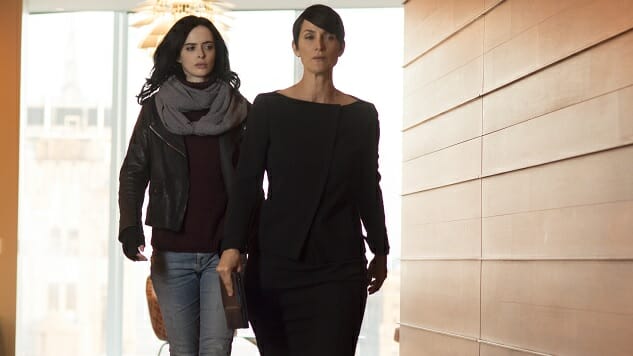
Marvel’s television brand has come a long way since the 2013 premiere of Agents of S.H.I.E.L.D. That show was the company’s coltish first step into the widening TV world—an awkward, gangly attempt at bringing their operatic, costumed rumpuses onto a smaller screen with a larger creative space. Over time, the series has shaped itself into a spy thriller increasingly peppered with superheroic pugilism; in the course of that slow-rolling evolution, Marvel has aired the uniformly great Agent Carter and the action extravaganza Daredevil, both of which proved more successful out the gate. What made the difference between these and S.H.I.E.L.D.? Setting? Atmosphere? A streamlined point of focus?
All of the above, really, and that’s part of what makes Marvel’s latest title, Jessica Jones, an instant winner. Like Daredevil, Jessica Jones exists in a hard-boiled, violent corner of the Marvel universe where the exploits of Tony Stark and Steve Rogers are spoken of only in casual and nigh legendary language; like Agent Carter, communication and interaction between characters comes down to who can land the snarkiest quip, or the swiftest blow. In the same vein as the adventures of Hayley Atwell, Jessica Jones also happens to be female-centric to its core. It’s a narrative about a female superhero, produced, written, and penned almost entirely by women telling women’s stories, boasting a cast that begins with Krysten Ritter, ends with Carrie Anne-Moss, and features men in supporting roles only.
And that femininity is a big part of what makes the show great. Jessica Jones’ gender spotlight lends the day-to-day life of the titular super-powered PI a prevailing sense of cohesion; side threads and secondary arcs bleed into the show’s primary through line, in which Jessica Jones (Ritter) spends her time taking cases and gumshoeing her way around New York City. The pilot, “AKA Ladies Night,” mostly concerns itself with introductions, taking us through her operating process as a detective, acquainting us with her slim list of allies—mostly comprised of Moss’ no-nonsense, high-powered attorney, Jeri Hogarth, but also Jessica’s best friend, radio talk show host Trish Walker (Rachael Taylor)—and her nocturnal obsession: Taking snapshots of a handsome and impressively muscled bartender (Mike Colter) for reasons viewers will come to appreciate later on in the series’ progression.
Coupled with the basics are shades of trauma and broad strokes of functional alcoholism. Jessica Jones is a rape survivor allegory; there’s no rape depicted, and barely any hinted at, except for rape of free will and rape of agency. Jessica drinks to forget her time spent in the thrall of Kilgrave (David Tennant), another powered type with a lurid fondness for brainwashing people and turning them into his smiling, loyal puppets. Jessica can leap to upper floor fire escapes, and she can hold a gauzy muscle car in place by its bumper.She can’t, however, fight a dominating patriarch, though by the time “AKA Ladies Night” comes to its shockingly bloody finale, she’s newly determined to try.
There’s so much room for Jessica Jones’ rape metaphor to add up to too much, and yet the writing handles the symbolic power of Kilgrave’s violations with surprising grace. It’s possible that this is the effect of female creative influence: Imagine a bunch of dudes writing a story about a female superhero forcibly turned into the willing, but unwilling lapdog to a psychotic pervert. You might end up with Jessica Jones in that alternate reality, but you might also end up with Ex Machina, which isn’t quite the place Marvel wants to be. Instead of pushing apologue to the forefront, Rosenberg and Clarkson let the subtext lay low. It’s the demon Jessica tangles with as she goes about investigating the disappearance of Hope (Erin Moriarty), a missing NYU student whose parents show up from the Midwest to employ Jessica’s services in tracking their daughter down; if you’re not a betting person, you’ll still feel comfy enough gambling on who’s behind her disappearance. (It’s Marvel. You know the drill.)
There’s a lot here that’s worth recommending. Jessica Jones is some of the best stuff to come out of Marvel Entertainment yet; Ritter, a woman born to articulate barbs, jabs, and all manner of verbal abuse through a tight snarl, is perfect as Jones, and the slick, noir-forward style sets the show apart aesthetically from its peers among the televised landscape at large, and its Marvel cousins in particular. Most of all, there’s purpose here, and a clear outline of what to expect from Jessica Jones as you prepare your binge watching session. Rosenberg has a goal to build toward, and a plan for getting there. That’s a pleasure to experience in its own right. That the rest of her elements, plot and character alike, are so well synchronized makes Jessica Jones absolutely essential.
Boston-based critic Andy Crump has been writing online about film since 2009, and has contributed to Paste Magazine since 2013. He also writes for Screen Rant, Movie Mezzanine, and Birth.Movies.Death. You can follow him on Twitter. He is composed of roughly 65% craft beer.